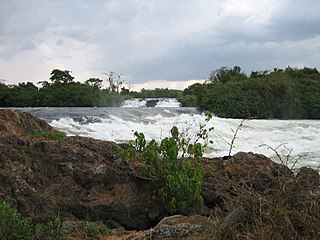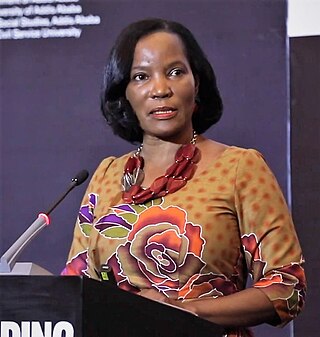Related Research Articles

The economy of Uganda has a great potential and appears poised for rapid growth and development. Uganda is endowed with significant natural resources, including ample fertile land, regular rainfall, and mineral deposits.

Burning of renewable resources provides approximately 90 percent of the energy in Uganda, though the government is attempting to become energy self-sufficient. While much of the hydroelectric potential of the country is untapped, the government decision to expedite the creation of domestic petroleum capacity coupled with the discovery of large petroleum reserves holds the promise of a significant change in Uganda's status as an energy-importing country.
Before Uganda's independence in 1962, the main banks in Uganda were Barclays ; Grindlays, Standard Bank and the Bank of Baroda from India. The currency was issued by the East African Currency Board, a London-based body. In 1966, the Bank of Uganda (BoU), which controlled the issue of currency and managed foreign exchange reserves, became the central bank and national banking regulator. The government-owned Uganda Commercial Bank and the Uganda Development Bank were launched in the 1960s. The Uganda Development Bank is a state-owned development finance institution, which channeled loans from international sources into Ugandan enterprises and administered most of the development loans made to Uganda.
Housing Finance Bank (HFB) is a commercial bank in Uganda. It is one of the commercial banks licensed by Bank of Uganda, the national banking regulator.
The Uganda Development Bank Limited (UDBL) is a government-owned development financial institution in Uganda.

The National Social Security Fund (NSSF), is a quasi-government agency responsible for the collection, safekeeping, responsible investment, and distribution of retirement funds from employees of the private sector in Uganda who are not covered by the Government Retirement Scheme. Participation for both employers and employees is compulsory. The Uganda National Social Security Fund is the largest pension fund in the countries of the East African Community, with total assets of USh18.58 trillion, as of June 2023.
Umeme Limited is the largest energy distributor in Uganda, distributing about 97 percent of all electricity used in the country. The shares of the stock of the company are listed on the Uganda Securities Exchange (USE) and are cross listed on the Nairobi Stock Exchange (NSE). As of December 2023, the company's total assets were approximately UGX:2.347 trillion, with shareholders' equity of approximately UGX:937.381 billion.

The Bujagali Power Station is a hydroelectric power station across the Victoria Nile that harnesses the energy of its namesake, the Bujagali Falls, in Uganda. Construction began in 2007 and concluded in 2012. It was officially inaugurated on 8 October 2012 by Ugandan President Yoweri Museveni and Aga Khan IV in the presence of African politicians and investors.
The National Water and Sewerage Corporation (NWSC) is a water supply and sanitation company in Uganda. It is wholly owned by the government of Uganda.
Isimba Hydroelectric Power Station is a 183.2 megawatts (245,700 hp) hydroelectric power station commissioned on 21 March 2019 in Uganda. Construction of this dam began in April 2015 and was completed in January 2019. Commercial operations began on 21 March 2019.
Richard Patrick Byarugaba is a Ugandan business executive, banker, and entrepreneur. He is the former managing director and chief executive officer of the National Social Security Fund (Uganda), a semi-autonomous retirement pension organisation for non-government employees in Uganda. He served in that capacity from November 2017 until November 2022. He was also listed in 2012 as one of the wealthiest individuals in Uganda.

Jennifer Semakula Musisi is a Ugandan lawyer and public administrator. She is the first City Leader in Residence at Bloomberg Harvard City Leadership Initiative at the Ash Center of the Harvard Kennedy School, in Cambridge, Massachusetts, United States. She was appointed to this position in January 2019.
The Uganda National Oil Company (UNOC), also known as the National Oil Company of Uganda, is a limited liability petroleum company in Uganda owned by the Ugandan government. The 2013 Petroleum Act of Uganda provides for the establishment of the national oil company. UNOC's board of directors was inaugurated on 23 October 2015 by the president of Uganda.
Mathias Katamba is a Ugandan economist, business executive, entrepreneur and banker. He was appointed as the non-executive chairman of the Uganda National Oil Company (UNOC), effective March 2024. Previously, from January 2019 until January 2023, he was the managing director and chief executive officer of DFCU Bank, a commercial bank in Uganda.
The Osukuru Industrial Complex sometimes referred to as Sukulu Industrial Complex, is a set of related industries, in the mining and manufacturing sectors, under construction in Uganda, the third-largest economy in the East African Community.
The Uganda Deposit Protection Fund (UDPF) is a Ugandan government agency that provides deposit insurance to depositors in Ugandan banks and deposit-taking microfinance institutions. The UDPF was created in July 1994. The law was amended in 2004 to create an independent agency, separate from the Bank of Uganda.
The Uganda Energy Credit Capitalisation Company (UECCC) is a company owned by the government of Uganda. It is responsible for coordinating funding from the Ugandan government, international development partners and the private sector, to invest in renewable energy infrastructure in Uganda, with emphasis on the promotion of private sector participation.
Florence Ndagire is a female Ugandan lawyer, who works as a legal researcher and human rights lawyer at the United Nations (UN) based in Geneva, Switzerland. Ndagire, who is totally blind, also serves as the chairperson of the UN Women Regional Group, for Eastern and Southern Africa, comprising twelve countries. She is the first visually impaired person, male or female to qualify and receive licensure as a lawyer in Uganda.
Sarah Arapta is a businesswoman and corporate executive from Uganda. She is the managing director and CEO of Citibank Uganda. She is also the Chairperson of Uganda Bankers Association since May 13, 2022
References
- 1 2 Peter Mwayi (24 March 2014). "Private sector taps into renewable energy". Daily Monitor . Kampala, Uganda. Retrieved 20 November 2017.
- ↑ Otage, Stephen (21 September 2011). "Government forms Shs24 trillion private sector energy credit fund". Daily Monitor . Kampala. Retrieved 20 November 2017.